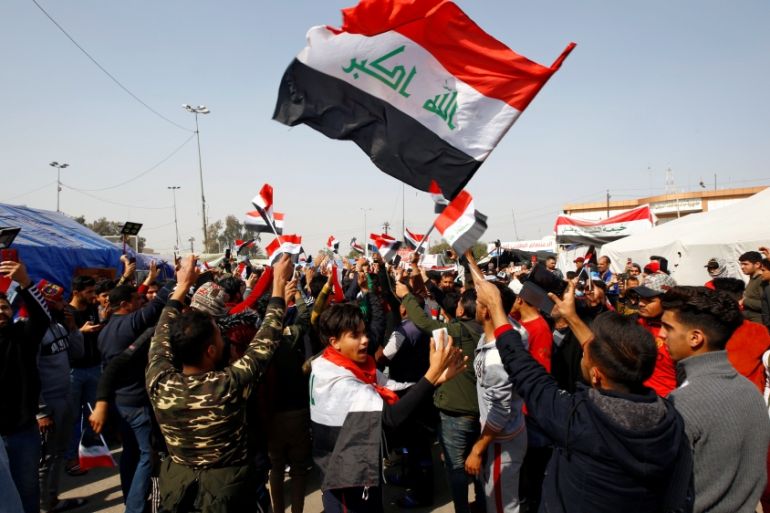Iraq protesters rally in Najaf after deadly clashes with Sadrists
Rally in southern city calls for investigation into deadly violence amid international condemnation.

Hundreds of anti-government protesters have taken to the streets of Iraq‘s holy city of Najaf, returning to the site of deadly clashes with supporters of influential Shia leader Muqtada al-Sadr the night before.
The crowd on Thursday decried violence as they rallied through the streets of the southern city, saying they planned to re-establish a protest camp that had become their focal point amid months-long demonstrations calling for a complete overhaul of Iraq’s political system.
Keep reading
list of 3 itemsTensions high in Baghdad as police fire tear gas, live bullets
‘The US is the reason for all of our misfortunes’
“We came to Sadrayn Square which al-Sadr’s supporters had taken over from us yesterday,” Muslim Abbas, a 21-year-old student in Najaf, told Al Jazeera as the rally came to an end.
“We do not want any more violence or clashes. We just want to set up our tents again,” he said, adding that al-Sadr’s Saraya al-Salam militia, also known as the blue hats due to their signature headgear, did not attempt to stop the crowds from entering the site.
Night of violence
It was a different scene on Wednesday evening when clashes erupted as al-Sadr’s supporters moved in to forcibly remove the demonstrators after the Shia leader called his followers to assist security forces in clearing roads and ensuring the reopening of schools and businesses after months of protests.
After the anti-government protesters attempted to stop al-Sadr’s supporters from entering the square, the blue hats responded by hurling petrol bombs and burning the protesters’ tents while gunfire rang out, according to witnesses.
At least seven people were killed and more than 120 others wounded, Ali al-Bayati of the Iraqi Human Rights Commission told Al Jazeera. Medical sources in Najaf put the death toll at nine.
An al-Sadr supporter told Al Jazeera on Thursday that the Shia leader’s followers were still in control of the square.
“Sadrists aren’t responsible for the situation that escalated. It’s those who tried to keep us out. But we’ve dealt with them,” said a member of Saray al-Salam, who did not wish to share his name. “The square is still under our control, but peaceful protesters are allowed in,” he added.
Iraq’s Prime Minister Adel Abdul Mahdi, who remains in a caretaker capacity after stepping down in November amid pressure from the protest movement, called on Thursday for the establishment of a committee to investigate the events in Najaf.
Meanwhile, Najaf’s Governor Luay al-Yassiri announced that public services and classes would be suspended on Thursday, with Iraqi media reporting that he also held emergency discussions with Iraq’s Minister of Interior Yasin al-Yassri, who arrived in the city the previous night.
|
|
As the events unfolded on Wednesday, Iraq’s Prime Minister-designate Mohamed Allawi called for calm in a post on Twitter. Describing the situation as “painful”, he called on Abdul Mahdi’s caretaker government to “protect protesters until a new government which responds to the public’s demands is formed”.
Escalating violence
The deadly incident on Wednesday is part of a string of violent clashes between al-Sadr’s supporters and anti-government protesters amid a widening divide between the two sides.
Tensions escalated in Iraq after President Barham Salih announced on Sunday the appointment of Allawi as the new prime minister-designate, a move rejected by the protesters demanding an end to corruption, better economic opportunities and basic services.
Al-Sadr had initially backed the protest movement, which began in early October in the capital Baghdad and Iraq’s mostly Shia south. But he has since changed his position several times, withdrawing his support before Allawi’s appointment, which prompted some of his supporters to leave the protest camps.
He then called on his followers to return to the streets, only to later shift positions again and urge them to “come together to reveal the saboteurs and the nationalist pretenders by helping the security forces.
“The blue hats have to pave the way for this with love peace and compassion,” he wrote on Twitter.
|
|
Observers have pinned the withdrawal of al-Sadr’s support for the protest movement as part of his agreement with the country’s largest parliamentary blocs, most of which are backed by Iran, to nominate Allawi for the prime minister’s position.
According to Iraq researcher Zeidon Kinani, the events on Wednesday night in Najaf were likely to spread to other cities.
“Al-Sadr is trying to control the streets and maintain its silence in return for his new partnership with Iran.
“He failed to do so in Baghdad, therefore he’s doing it in Najaf today,” said Kinani.
“Similar acts from his militia Saray al-Salam will reoccur in other provinces,” he added.
On Thursday, witnesses said 10 people were wounded in clashes in the central city of Karbala between anti-government protesters and al-Sadr’s supporters. Calm soon returned after security forces intervened to break up the clashes in Tarbiya Square.
Meanwhile, the US embassy in Iraq on Thursday issued a strongly-worded statement condemning the violence in Najaf.
“It is reprehensible that armed groups continue to be permitted to violate Iraq’s rule of law with impunity against peaceful citizens practicing their democratic right to freedom of expression, including demands for political and economic reform,” said the statement.
“The Government of Iraq and its Security Forces have an obligation to put an end to this thuggery, which includes kidnapping and assassination of civil activists and journalists, as well as beatings, use of live fire, and the burning of tents at peaceful demonstration.”
The United Nations Mission in Iraq also denounced the violence, saying in a statement that “peaceful protesters must be protected at all times”.
More than 500 people have been killed since the protests began in October, with rights groups accusing the country’s security forces of using excessive force against the protesters.
Abdallah al-Salam contributed to this report from Baghdad, Ahmed al-Najafi from Najaf
|
|